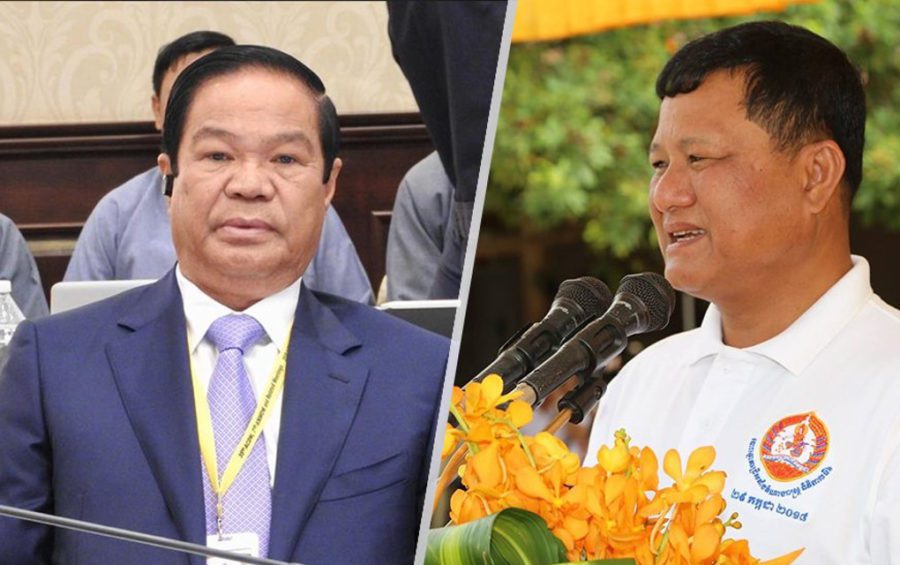The U.S. government on Monday sanctioned a senior Cambodian official and a timber tycoon, both close allies of Prime Minister Hun Sen, for alleged corruption, a move that Cambodia branded an “ambush” that threatened bilateral relations.
The U.S. Treasury Department leveled sanctions under the Global Magnitsky Act against Kun Kim, the National Committee for Disaster Management first vice president and former Royal Cambodian Armed Forces chief of staff, and Try Pheap, a timber tycoon and former adviser to Hun Sen, according to a Treasury statement.
The U.S. Office of Foreign Assets Control also added to its specially designated sanctions list 11 companies owned or controlled by Pheap, three members of Kim’s family — King Chandy, Kim Sophary and Kim Phara — and five companies owned or controlled by Kim’s family.
Assets in the U.S. belonging to the men, Kim’s family members, and the 16 noted companies were blocked and must be reported to the Office of Foreign Assets Control, the statement says.
The U.S. sanctions come amid heightened pressure on Cambodia from both the U.S. and the E.U. over the nation’s human rights record and political situation following the 2017 arrest and jailing of Kem Sokha, the leader of the opposition CNRP, which was dissolved by the Supreme Court two months after his detention.
The Phnom Penh Municipal Court on Monday set Sokha’s trial date for January 15, more than two years after his arrest on a charge of conspiracy with a foreign power over allegations that he attempted to overthrow the government with U.S. support.
Both he and the U.S. have denied the accusations and Washington has called for the charges against Sokha to be dropped.
The U.S. alleged Kim and Pheap have been involved in widespread corruption, directly or indirectly, including “misappropriation of state assets, the expropriation of private assets for personal gain, corruption related to government contracts or the extraction of natural resources, or bribery.”
Neither Kim nor Pheap could be reached for comment on Tuesday.
Kim, the former RCAF chief of staff, was “instrumental” in an unidentified Koh Kong development and had “reaped significant financial benefit” from his relationship with an unnamed Chinese-state-owned entity, the U.S. claims.
He “used RCAF soldiers to intimidate, demolish, and clear-out land” sought by the Chinese company, and was replaced in his military position because he “had not shared profits from his unlawful businesses with senior Cambodian government officials,” according to the U.S.
The U.S. accused Pheap — who holds the title of okhna, an honorific bestowed after donations to the state coffers of at least $500,000 — of building a “large scale illegal logging consortium that relies on the collusion of Cambodian officials, to include purchasing protection from the government, including military protection, for the movement of his illegal products.”
“Pheap used the Cambodian military to enable his timber trafficking activities and sell to buyers in Vietnam, China, Europe, and Russia,” the U.S. said. “The support of these officials makes it difficult for local authorities to take lawful action against Pheap, as in one example, Cambodian National Park officials were paid by Pheap to keep his operations secret from the international community.”
The Foreign Affairs Ministry on Tuesday responded to the sanctions by expressing “strong dismay over the arbitrary designation.”
“It is very disturbing when public figures of a country have become subjects of punitive measures of another country based on groundless accounts and accusations in total disregard of the legal and judicial independence of the country,” the ministry said in a statement.
Kim was “well known for his great contribution to the protection and the maintenance of peace, stability and social order,” while Pheap actively supported the nation’s socioeconomic development, the ministry said.
The U.S. sanctions were an “ambush against the ongoing efforts to restore trust and confidence” between the two countries, it added, citing recent letters exchanged between Hun Sen and U.S. President Donald Trump.
Government spokesman Phay Siphan, however, said the sanctions were unrelated to Cambodia’s relationship with the U.S.
“The Cambodia-U.S. relationship has continued energetically in a context of mutual respect for each nation and their sovereignty,” Siphan said.
Last month, in a letter to Trump, Hun Sen said their two nations had been through “ups and downs” together, but their bonds of friendship could still be renewed.
“You can probably appreciate our struggle to find full peace,” Hun Sen wrote, calling Cambodia a “very young democracy.”
“I appreciate your understanding and patience in that respect,” he added.
Trump had earlier written to Hun Sen, asking him to “put Cambodia back on the path of democratic governance.”
“As a first step, I hope you will re-evaluate certain decisions taken by your government,” Trump wrote.
Political analyst Em Sovannara said Washington had started applying sanctions against Cambodians one by one.
“The U.S. is reminding or warning Cambodia to respect what was written in Donald Trump’s letter,” Sovannara said.
If Phnom Penh didn’t follow through, he said, the U.S. may use other measures against even more Cambodian political figures in the future.
Last year, Hing Bun Heang, commander of Hun Sen’s Bodyguard Unit, was sanctioned under the Global Magnitsky Act for leading “an entity involved in serious human rights abuses.”
The U.S. Treasury Department said at the time that the unit had been “implicated in multiple attacks on unarmed Cambodians over the span of many years,” including in 2013 and 2015.












